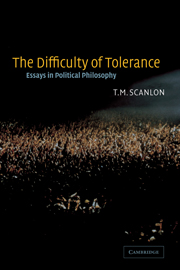Book contents
- Frontmatter
- Contents
- Acknowledgments
- Introduction
- 1 A theory of freedom of expression
- 2 Rights, goals, and fairness
- 3 Due process
- 4 Preference and urgency
- 5 Freedom of expression and categories of expression
- 6 Human rights as a neutral concern
- 7 Contractualism and utilitarianism
- 8 Content regulation reconsidered
- 9 Value, desire, and quality of life
- 10 The difficulty of tolerance
- 11 The diversity of objections to inequality
- 12 Punishment and the rule of law
- 13 Promises and contracts
- Index
5 - Freedom of expression and categories of expression
Published online by Cambridge University Press: 15 December 2009
- Frontmatter
- Contents
- Acknowledgments
- Introduction
- 1 A theory of freedom of expression
- 2 Rights, goals, and fairness
- 3 Due process
- 4 Preference and urgency
- 5 Freedom of expression and categories of expression
- 6 Human rights as a neutral concern
- 7 Contractualism and utilitarianism
- 8 Content regulation reconsidered
- 9 Value, desire, and quality of life
- 10 The difficulty of tolerance
- 11 The diversity of objections to inequality
- 12 Punishment and the rule of law
- 13 Promises and contracts
- Index
Summary
INTRODUCTION
Freedom of expression, as a philosophical problem, is an instance of a more general problem about the nature and status of rights. Rights purport to place limits on what individuals or the state may do, and the sacrifices they entail are in some cases significant. Thus, for example, freedom of expression becomes controversial when expression appears to threaten important individual interests in a case like the Skokie affair, or to threaten some important national interest such as the ability to raise an army. The general problem is, if rights place limits on what can be done even for good reasons, what is the justification for these limits?
A second philosophical problem is how we decide what these limits are. Rights appear to be something we can reason about, and this reasoning process does not appear to be merely a calculation of consequences. In many cases, we seem to decide whether a given policy infringes freedom of expression simply by consulting our conception of what this right entails. And while there are areas of controversy, there is a wide range of cases in which we all seem to arrive at the same answer. But I doubt that any of us could write out a brief, noncircular definition of freedom of expression whose mechanical application to these clear cases would yield the answers on which we all agree. In what, then, does our agreement consist?
- Type
- Chapter
- Information
- The Difficulty of ToleranceEssays in Political Philosophy, pp. 84 - 112Publisher: Cambridge University PressPrint publication year: 2003
- 13
- Cited by



